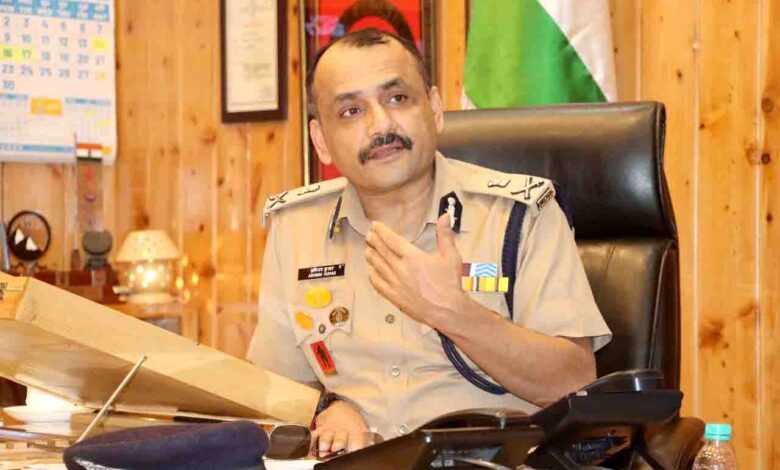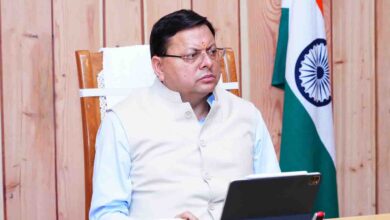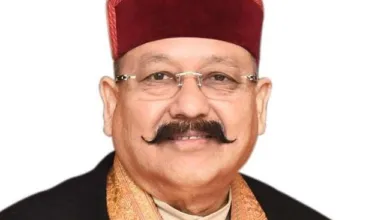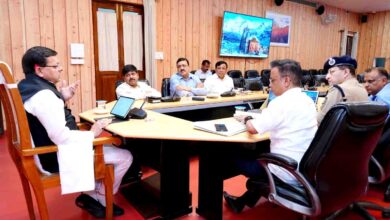DGP commits to making Uttarakhand police a model of sustainability

Friday, 20 September 2024 | Purnima Bisht | Dehradun
Abhinav Kumar, an IPS officer of the 1997 batch, took charge as the director general of police on November 30, 2023, becoming the 12th DGP of Uttarakhand and one of the youngest DGPs in the country. In an exclusive interaction with Purnima Bisht of The Pioneer, Kumar shared insights on his achievements over the past 10 months while addressing crucial issues like strengthening women’s safety and curbing the rising threat of cyber crimes. He also shared his vision for further enhancing the efficiency and capabilities of the State’s police force.
What measures has the police taken to ensure the safety of both tourists and locals amid increasing tourism in Uttarakhand?
The surge in tourism has indeed put pressure on the infrastructure, particularly in terms of traffic management and road safety. The rise in the number of restaurants, hotels and cafes has exacerbated traffic congestion in popular areas. While the fluctuating tourist population continues to grow, the corresponding expansion of the road network has not happened due to geographical limitations in certain areas. We are currently formulating plans to increase the deployment of police personnel dedicated solely to managing tourist zones. This will help ensure smoother traffic flow, faster response times during emergencies and enhanced safety in general.
The State Disaster Response Force (SDRF) has been doing commendable work during disasters. What is being done to ensure timely access to accident sites and additional resources to enhance their efforts?
The SDRF is being consistently trained and upgraded in terms of skills, technology and equipment. Given Uttarakhand’s challenging geography, timely response can be difficult, but we are actively working to address these issues. Work is in progress to ensure our teams have the necessary resources to respond more efficiently in remote and mountainous areas. We have also marked land for an SDRF battalion in Almora. We are hopeful that construction will commence by the end of this year, which will significantly improve our disaster response capabilities in the Kumaon area.
What steps are planned or have been taken to tackle increasing cyber crime in Uttarakhand?
Regular training sessions are held to ensure officers are well-equipped to handle cyber crimes. One of our major initiatives is the establishment of a national-level Cyber Crime Centre of Excellence in Dehradun, which will further enhance the police’s capability to tackle cyber criminals by providing specialised training and technological support.
You are approaching one year as the Uttarakhand DGP. What would you say are your key achievements, and what challenges remain to be addressed?
My primary focus has been on ensuring swift and effective action, particularly in cases involving crimes against women and children. A high-level committee dedicated to curbing crimes against women was recently established to ensure that perpetrators face strict and timely justice. I have also emphasised professional conduct within the Police department, especially in addressing concerns about the mistreatment of female police personnel by their male colleagues. It is unacceptable in every profession and we have put mechanisms in place to ensure that any complaints of harassment are taken seriously and dealt with immediately to create a safer and more respectful working environment for women in the police.
The government recently announced an allocation of Rs 100 crore annually to improve police housing and develop necessary facilities. Separate housing is also being constructed for the families of police personnel deployed in border areas, ensuring their children have access to quality education and a safe living environment. I also have a vision to make the Uttarakhand police a green Police by reducing our carbon footprint and integrating renewable energy sources wherever possible. The groundwork for this has already begun, and while it will take a few more years, I believe the outcomes will be transformative.
Also, we are working on ensuring promotions for about 30 officers to the rank of deputy superintendent of police after nine years of service to recognise their dedication and contributions, which will also improve policing. Improving the experience for female victims and complainants at police stations is also a priority. We are setting up dedicated areas in each station to ensure women feel comfortable and secure while discussing their issues. Addressing traffic and parking challenges is also a priority and we are actively working towards solutions in that regard.
Since you took over as DGP, it has been observed that the police are no longer hesitant to engage in encounters when necessary, unlike before. How do you view this shift?
Following the 2009 Ranbir Singh encounter case, the Uttarakhand police entered a defensive mode, which, in my view, made the State a soft target for perpetrators, especially those from outside. The focus may have shifted too much towards friendly policing, which, while important for maintaining public trust, should not extend to criminals. My priority has been to strengthen and empower our police force, which I believe is fully capable of handling any kind of criminal threat. Friendly policing is for the public, the citizens we serve, but we must be firm and decisive when it comes to dealing with criminals. I have instructed all district police officers to act swiftly and decisively against criminal elements, including raising arms when absolutely necessary. In the past 10 months, we have conducted at least 11 encounters, two of which resulted in fatalities. However, the use of force is always a last resort, applied only when the situation demands it.
What steps are being taken to combat the growing issue of drug trafficking and substance abuse?
The focus needs to shift from merely arresting peddlers and small-time smugglers to catching the big fish who are deeply entrenched in the drug trade. To address this, the Special Task Force (STF) has been specifically directed to trace the larger networks and those orchestrating these illegal activities from behind the scenes. We are also coordinating closely with the police of neighbouring states, as most of the drugs entering Uttarakhand are trafficked from nearby areas. Cross-border collaboration will help us take stricter action against the major culprits involved.
There is also a pressing need for a comprehensive survey and systematic data collection to identify individuals struggling with addiction, as they are more vulnerable to becoming involved in crime. Arresting drug addicts and putting them in jail alongside serious criminals will only worsen the situation. Rehabilitation is key. We are planning to work on initiatives that focus on providing proper rehabilitation facilities to help addicts recover and reintegrate into society, ensuring they do not become future criminals.
With the State’s demographics evolving, what is the current status of the verification drive? Are claims of Rohingyas residing in Uttarakhand also true?
The verification drive is progressing at full pace across all districts. It will continue till October, after which we will have comprehensive data available. As for the claims regarding Rohingyas in Uttarakhand, these are largely baseless rumours being spread on social media. During our verification so far, we have not encountered any Rohingya individuals residing here.
How do you view the noticeable rise in reports of sexual crimes against women and children in recent times?
What we are seeing is a greater willingness from victims to come forward and report such crimes. This reflects a positive shift—people now feel more empowered to approach the police. Instead of viewing it as a sudden rise in such crimes, I view it as the society evolving and women feeling comfortable speaking out. Law enforcement is also increasingly sensitised to these issues, which has led to more cases being reported and acted upon. This is a step in the right direction.






